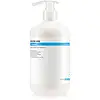What's inside
What's inside
 Key Ingredients
Key Ingredients

 Benefits
Benefits

 Concerns
Concerns

 Ingredients Side-by-side
Ingredients Side-by-side

Water
Skin ConditioningPEG-80 Sorbitan Laurate
Cocamidopropyl Betaine
CleansingSodium Laureth Sulfate
CleansingSodium Trideceth Sulfate
CleansingPolysorbate 20
EmulsifyingDecyl Glucoside
CleansingPEG-150 Distearate
EmulsifyingSodium Lauroamphoacetate
CleansingPhenoxyethanol
PreservativeCaprylyl Glycol
EmollientPropanediol
SolventTocopheryl Acetate
AntioxidantPEG-35 Castor Oil
EmulsifyingTetrasodium EDTA
Citric Acid
BufferingCamellia Sinensis Leaf Extract
AntimicrobialWater, PEG-80 Sorbitan Laurate, Cocamidopropyl Betaine, Sodium Laureth Sulfate, Sodium Trideceth Sulfate, Polysorbate 20, Decyl Glucoside, PEG-150 Distearate, Sodium Lauroamphoacetate, Phenoxyethanol, Caprylyl Glycol, Propanediol, Tocopheryl Acetate, PEG-35 Castor Oil, Tetrasodium EDTA, Citric Acid, Camellia Sinensis Leaf Extract
Water
Skin ConditioningPEG-80 Sorbitan Laurate
Cocamidopropyl Betaine
CleansingSodium Trideceth Sulfate
CleansingGlycerin
HumectantSodium Lauroamphoacetate
CleansingPEG-150 Distearate
EmulsifyingSodium Laureth-13 Carboxylate
CleansingDisodium Cocoamphodiacetate
CleansingButylene Glycol
HumectantSalvia Officinalis Extract
AntimicrobialCucumis Sativus Fruit Extract
EmollientSalix Alba Bark Extract
AstringentPanthenol
Skin ConditioningAllantoin
Skin ConditioningAcrylates Copolymer
Methyl Gluceth-20
HumectantPolysorbate 20
EmulsifyingQuaternium-15
PreservativeDMDM Hydantoin
PreservativeDisodium EDTA
Water, PEG-80 Sorbitan Laurate, Cocamidopropyl Betaine, Sodium Trideceth Sulfate, Glycerin, Sodium Lauroamphoacetate, PEG-150 Distearate, Sodium Laureth-13 Carboxylate, Disodium Cocoamphodiacetate, Butylene Glycol, Salvia Officinalis Extract, Cucumis Sativus Fruit Extract, Salix Alba Bark Extract, Panthenol, Allantoin, Acrylates Copolymer, Methyl Gluceth-20, Polysorbate 20, Quaternium-15, DMDM Hydantoin, Disodium EDTA
 Reviews
Reviews

Ingredients Explained
These ingredients are found in both products.
Ingredients higher up in an ingredient list are typically present in a larger amount.
Cocamidopropyl Betaine is a fatty acid created by mixing similar compounds in coconut oil and dimethylaminopropylamine, a compound with two amino groups.
This ingredient is a surfactant and cleanser. It helps gather the dirt, pollutants, and other impurities in your skin to be washed away. It also helps thicken a product and make the texture more creamy.
Being created from coconut oil means Cocamidopropyl Betaine is hydrating for the skin.
While Cocamidopropyl Betaine was believed to be an allergen, a study from 2012 disproved this. It found two compounds in unpure Cocamidopropyl Betaine to be the irritants: aminoamide and 3-dimethylaminopropylamine. High-grade and pure Cocamidopropyl Betaine did not induce allergic reactions during this study.
Learn more about Cocamidopropyl BetainePeg-150 Distearate is an emulsifier and thickening agent. It is created from stearic acid.
As an emulsifier, peg-150 distearate helps other ingredients dissolve. This helps prevent ingredient separation.
This ingredient may not be Malassezia folliculitis, or fungal-acne safe.
Learn more about PEG-150 DistearatePEG-80 Sorbitan Laurate isn't fungal acne safe.
Polysorbate 20 is made by combining ethoxylation of sorbitan, ethylene oxide, and lauric acid. It is a mild cleansing agent, surfactant, and emulsifier.
As a surfactant, it helps collect dirt and oils for washing. Emulsifiers prevent oils and water from separating.
Polysorbate 20 also adds scent to a product. Since it is made using sorbitol, it has a sweet scent. Sorbitol can also be found in fruits such as apples and peaches.
The lauric acid used to create Polysorbate 20 is often derived from coconuts.
Polysorbate 20 may not be fungal acne safe.
Learn more about Polysorbate 20We don't have a description for Sodium Lauroamphoacetate yet.
Sodium Trideceth Sulfate is a type of sulfate.
Water. It's the most common cosmetic ingredient of all. You'll usually see it at the top of ingredient lists, meaning that it makes up the largest part of the product.
So why is it so popular? Water most often acts as a solvent - this means that it helps dissolve other ingredients into the formulation.
You'll also recognize water as that liquid we all need to stay alive. If you see this, drink a glass of water. Stay hydrated!
Learn more about Water